Animal Lover Flips Out After Finding Out Her Sister Locked Her Adopted Kitten In A Drawer To Prevent It From Escaping
It is easy to say that you will intervene when you see someone doing something wrong. Standing up for what's right is easier said than done, especially when the person doing the wrong thing is a friend or a loved one.
Being an upstanding person and doing the right thing has its own consequences as well. Calling out someone you know for doing a bad thing can hurt their feelings.
This OP's younger sister certainly felt that way when it was pointed out that she was hurting her cat. The two sisters each got kittens recently.
OP wanted a cat after losing her dog and thought a cat would help her get through the grief faster. Her 17-year-old sister wanted one because she heard OP wanted one.
OP was pleasantly surprised to see her sister actually care for the kitten she adopted. However, OP has seen some concerning behaviors that rightfully freaked her out.
Her sister basically keeps the cat locked in her room all day and ignores the cat even when it cries out, begging to go out. She also frequently forgets to feed her.
Worst of all, OP has seen her lock the cat inside a drawer to prevent her from escaping when she needs to keep her bedroom door open. When OP found out about the cat being kept in a drawer, she flipped out.
OP told her sister she was f*cked up for doing that to the kitten

Her sister said it's not hurting the cat since she just lays there all day and seems to enjoy it.
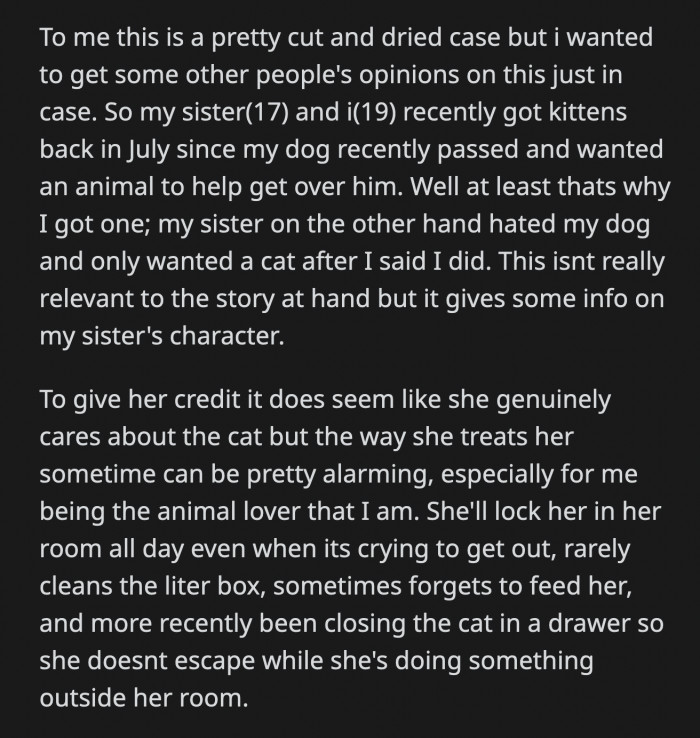
She didn't really mind OP telling her off until OP explained what happened to their parents.
She accused OP of acting like a 12-year-old tattletale. She then called her boyfriend to badmouth OP and made fun of her mental health issues.
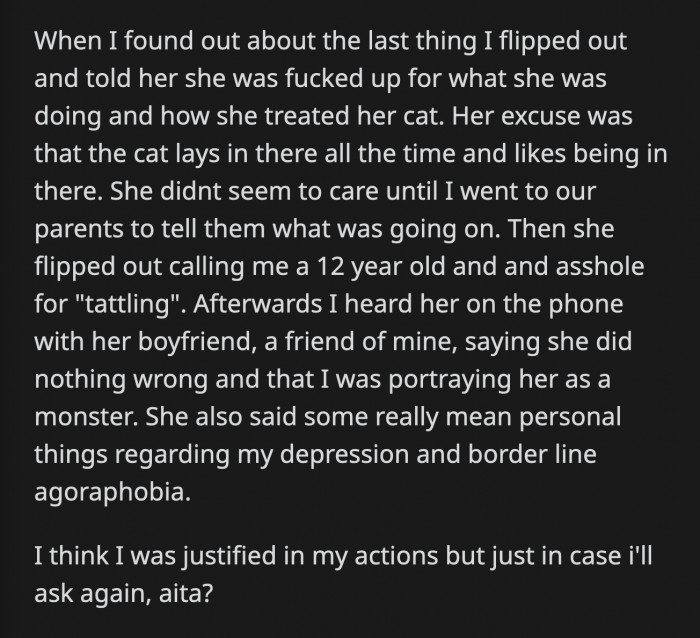
The Psychological Effects of Animal Care
The act of caring for a pet, particularly one that has been adopted, can evoke a range of emotions, including protectiveness and anxiety. Research published in the Journal of Animal Psychology indicates that pet owners often feel a strong responsibility towards their animals, especially when they come from difficult backgrounds. This sense of responsibility can lead to heightened emotional responses when the pet's safety is perceived to be at risk, as seen in this situation.
Understanding the emotional stakes involved in pet ownership is crucial for fostering empathy and support among family members.
Her sister may not appreciate it now, but OP is doing right by her and the cat.
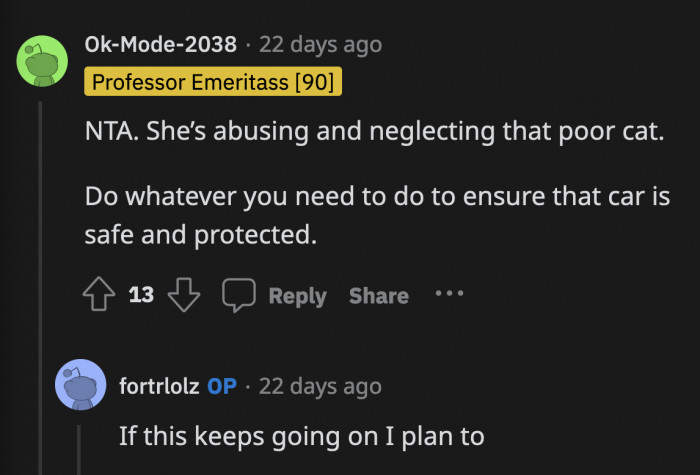
Calling your pet Ms. Stinky Butt is funny, but neglecting to feed them multiple times is plain cruel.

A few times a month is a few times too many, no matter what her schedule is. She is a pet owner, and her cat depends on her to stay alive.
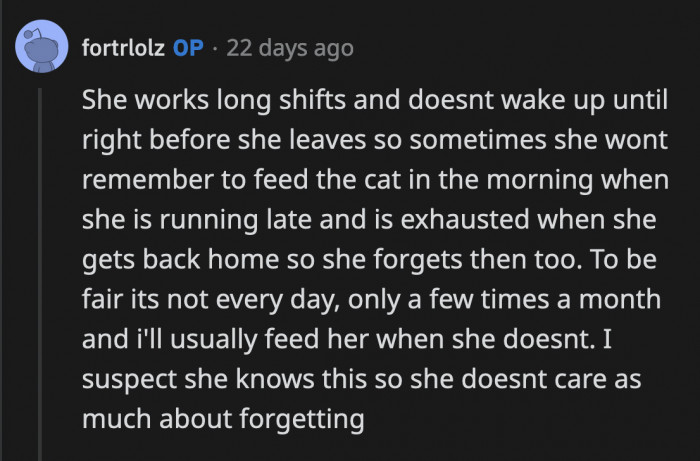
Moreover, the behavior of locking the kitten in a drawer reflects a misunderstanding of the animal's needs and an inability to recognize the consequences of such actions. According to Dr. Sarah Lentz, a psychologist specializing in animal behavior, individuals who do not understand animal welfare may engage in harmful behaviors unintentionally. This situation highlights the importance of educating family members about the appropriate care and treatment of pets, fostering a more compassionate environment.
Addressing these misunderstandings through open conversations can prevent future conflicts and promote a more supportive atmosphere for the animals.
An automatic feeder will definitely help them. Plus, OP's sister is wrong; she is not an a**hole — she is just looking out for her and the cat.
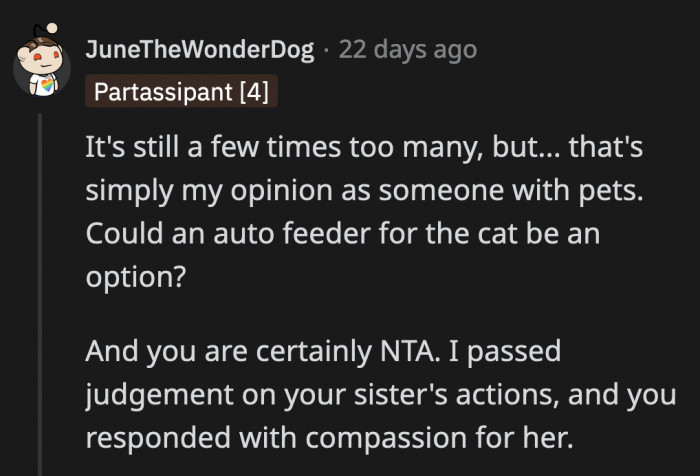
Unfortunately, being a responsible pet owner is the only solution since their kittens are scared of automatic feeders.
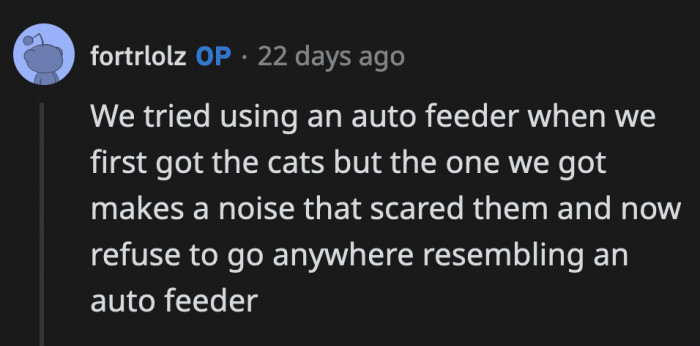
I didn't think you have to explicitly tell someone that locking an animal inside a drawer is cruel, but here we are. OP's parents have to step up since her sister is not listening to her.
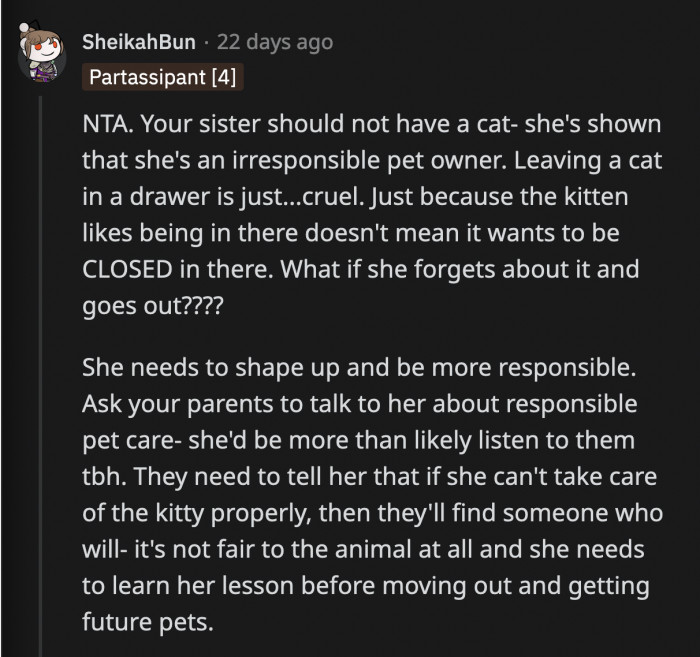
Strategies for Promoting Understanding of Animal Welfare
To navigate conflicts surrounding pet care, families should prioritize education and open communication. According to Dr. William Doherty, a family therapist, "Understanding and discussing the needs of pets can foster empathy and improve family relationships." Engaging in discussions about proper pet care and sharing resources on animal behavior can help bridge gaps in understanding, creating a more harmonious living environment.
Additionally, family members may benefit from participating in workshops or training sessions focused on animal care, which can further promote empathy and compassion towards the animals in their care.
OP tried to make her sister empathize with the cat to see why what she's doing is awful, but her sister didn't listen. Unfortunately, her parents will not be helpful since they have a hands-off approach.
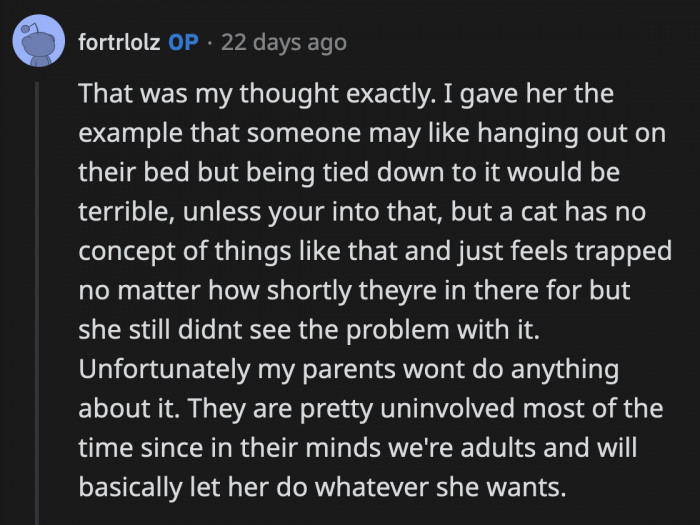
This solution could be the only option to make OP's sister see what she's doing to the kitten.
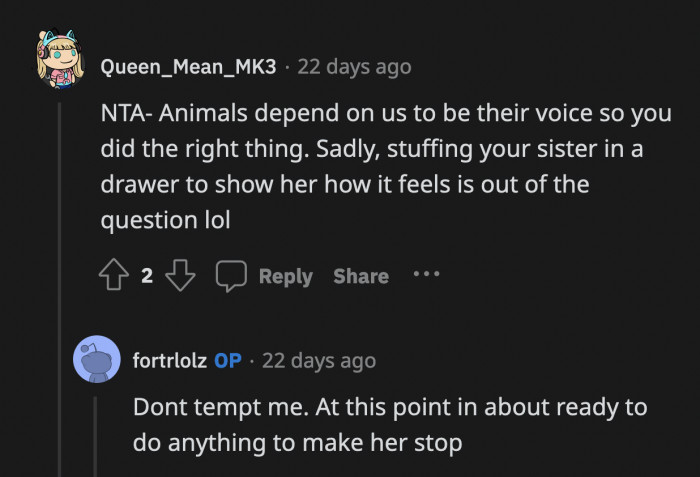
Another solution is for OP's sister to train the cat to get used to a carrier. That way, the cat won't escape, and it also wouldn't be locked in a cramped space where it could potentially get hurt.
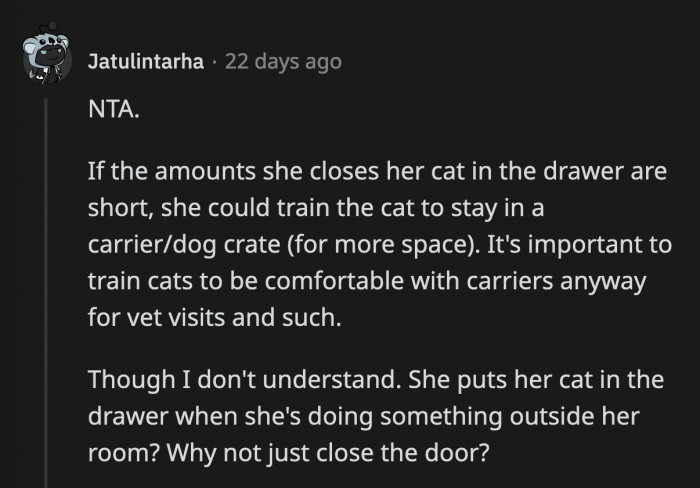
OP is doubtful if her sister will be willing to spend money to buy a cat carrier. The cat is constantly trying to get out of the room because OP's sister locks her in the room all day.
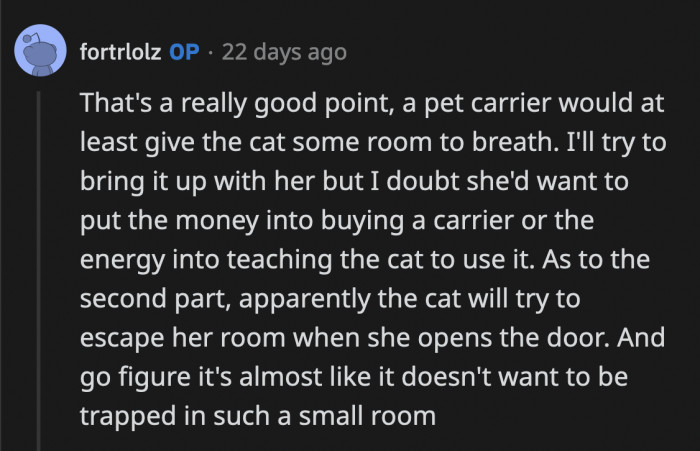
OP's sister doesn't have the chops to be a responsible pet owner based on OP's comments. Redditors helpfully shared some potential solutions, but OP doubted her sister would be willing to try any of them.
It looks like OP has to either rehome the cat or take it for herself. OP's sister only wanted a cat after learning that OP wanted one; the novelty probably wore off, and now she can't be bothered to provide its most basic needs.
Psychological Analysis
This situation illustrates the complexities of understanding animal needs and the emotional stakes involved in pet ownership. The individual's reaction to the sister's behavior reflects a deep concern for the kitten’s well-being. It's essential for families to engage in discussions that promote awareness and understanding of proper animal care to prevent such conflicts.
Analysis generated by AI
Analysis & Alternative Approaches
In conclusion, the emotional complexities of pet care can significantly impact family dynamics and individual well-being. According to Dr. John Gottman, a renowned marriage researcher, "Understanding and empathy are crucial in maintaining healthy relationships, whether between humans or with our pets." Fostering this understanding around animal welfare is essential for harmonious relationships. By addressing these issues collaboratively, families can create a supportive environment that respects the needs of all members, human and animal alike.



